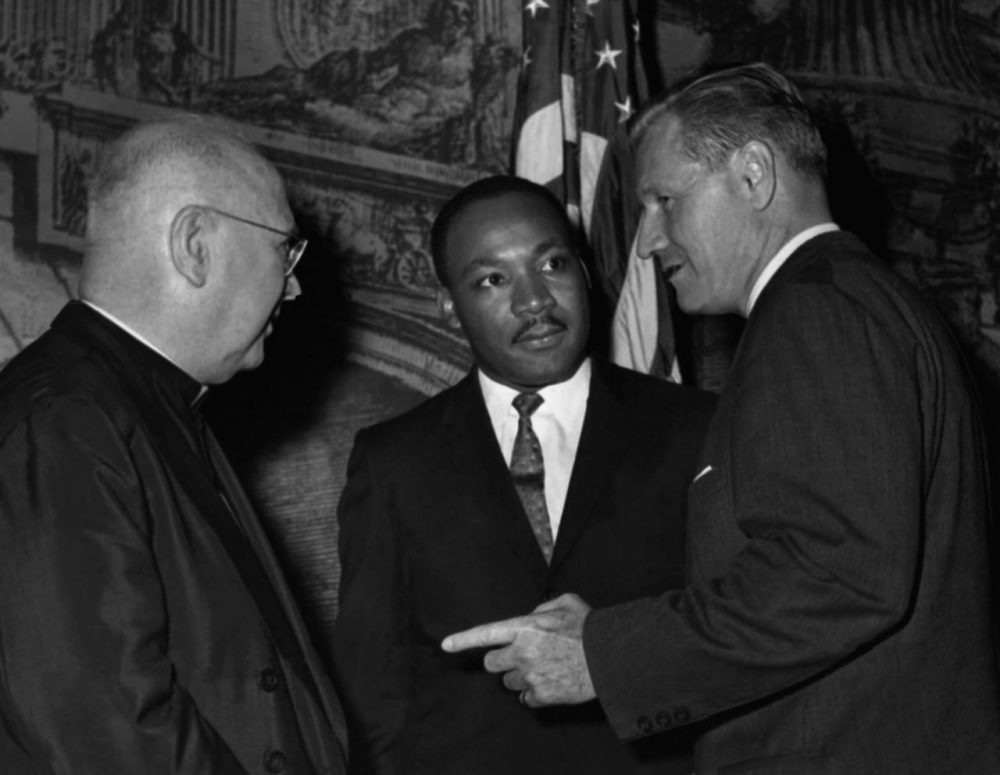Advertisement
1964 Dr. Martin Luther King, Jr. Speech Discovered By Amherst College Archives
Resume
Archivists at Amherst College have discovered something amazing in some dusty boxes of old reel-to-reel audio tapes: the only known recording of Dr. Martin Luther King, Jr.'s 1964 speech at the New School in New York.
It was called "The Summer of Our Discontent," and in it, King explained why the civil rights movement caught fire in 1963. One factor, he said, was the 100th anniversary of the signing of the Emancipation Proclamation.
"With the dawn of 1963, plans were afoot all over the land to celebrate the Emancipation Proclamation. In Washington, a federal commission had been established to mark the event. Governors of states and mayors of cities had utilized the date to enhance their political image by naming commissions, receiving committees, issuing statements, planning state pageants, sponsoring dinners, endorsing social activities. Champagne, this year, would bubble on countless tables. Appropriately attired, over thick cuts of roast beef, legions would listen as luminous phrases were spun to salute the great democratic landmark which 1963 represented."
"But alas! All the talk and publicity accompanying the centennial only served to remind the Negro that he still wasn’t free, that he still lived a form of slavery disguised by certain niceties of complexity. The pen of the Great Emancipator had moved the Negro into the sunlight of physical freedom, but actual conditions had left him behind in the shadow of political, psychological, social, economic, and intellectual bondage."
King went on to explain why nonviolent action was, what he called, "the methodology suited to the circumstances of the period."
"Like his predecessors, the Negro was willing to risk martyrdom in order to move and stir the social conscience of his community and the nation. Instead of submitting to organized cruelty in thousands of dark jail cells and on countless shadowed street corners, he would force his oppressor to commit his brutality openly, in the light of day, with the rest of the world looking on."
"Acceptance of nonviolent direct action was a proof of a certain sophistication on the part of the Negro masses; for it showed that they dared to break with the old, ingrained concepts of our society. The eye-for-an-eye philosophy, the impulse to defend oneself when attacked, has always been held as the highest measure of American manhood. We are a nation that worships the frontier tradition, and our heroes are those who champion justice through violent retaliation against injustice. It is not simple to adopt the credo that moral force has as much strength and virtue as the capacity to return a physical blow; or that to refrain from hitting back requires more will and bravery than the automatic reflexes of defense. The argument that nonviolence is a coward’s refuge lost its force as its heroic and often perilous acts uttered their wordless but convincing rebuttal in Montgomery, in the sit-ins, on the freedom rides, and finally in Birmingham."
More
The Boston Globe: Recording Of MLK Speech Discovered At Amherst College
- "Among long-forgotten boxes of recordings from Amherst College’s student radio station was a tape labeled 'Martin Luther King, Pres. of the Southern Christian Leadership Conference, speaking at the New School for Social Research on The Summer of our Discontent.'
This segment aired on January 19, 2016.